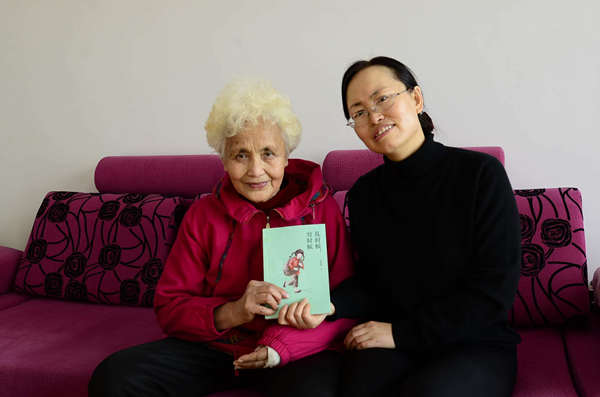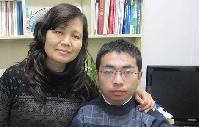Mission possible
 |
|
Jiang Shumei and her daughter Zhang Ailing show off her newly published autobiography, Chaotic Times, Poor Times. Photo provided to China Daily |
Jiang Shumei was illiterate for much of her life. She only started learning to write Chinese characters at 60. Not only did she become proficient enough to read the voluminous Mo Yan collections, she turned to writing at 75 and produced a popular memoir a year later. The slim, vivacious, silver-haired grandmother, born in Juye, Shandong province in 1937, has recently published Chaotic Times, Poor Times, a 100,000-word nonfiction with incredible tales from the past century. Writing the book did not come easy because Jiang only knows a thousand or so characters. But she invented rhyming songs, and simple poetic verses and asked her grandchildren to write them down so that she could memorize the characters. She watched the China Central Television's opera channel so that she could learn more characters by reading the subtitles.
Eventually, she had the basics of written language so she could write her life story.
She gathered some of the stories from her parents. Like the one about the crude, excruciating penalty for murder and adultery by "lighting the sky lamp". Flesh was dug out of the murderer's or adulterer's shoulders and the wounds filled with oil and a candle wick, lit up, and the flame and pain would slowly consume the sinner. It was a practice that continued in Shandong until the 1920s.
She has also illustrated some eventful and emotional experiences in her book.
Jiang had to flee from her hometown during the War of Resistance against Japanese Aggression (1937-45) and War of Liberation (1946-49). While on the run, she witnessed many macabre deaths. She comments: "I don't know what fear is".
She didn't meet her husband until the moment they registered their marriage. "I told myself, I would take him no matter how discontent I would be," she recalls. He turned out to be "not too bad".
She survived the famine in the early 1960s, often sustaining herself on leaves. "Pagoda leaves are tasteless, mulberry leaves prick, elm tree leaves are the best," she writes. "We stripped elm trees bare one particularly hard year. They all died."
She claims to have been possessed by a weasel when her family first migrated to Northeast China's Heilongjiang province. She was thrown over by an unknown force and thudded headlong on the floor. According to the village lore, the weasel was seeking revenge for its lost lair.
In Heilongjiang, Jiang made a living porting tiles and selling alkali.
For much of her life, she worked hard for food and shelter. "I remember, for a long time, I had this wish, 'if only I can have maize for food, it would be such bliss'," she says.
When she finally retired, Jiang remained the busy, loving parent, always there to help her grown children. But a car crash changed her life.
When Jiang turned 60, her husband died in an accident. Desperate for distraction, she started learning to read, something she had never learned to do because of the wars and tough daily battle for survival.


















